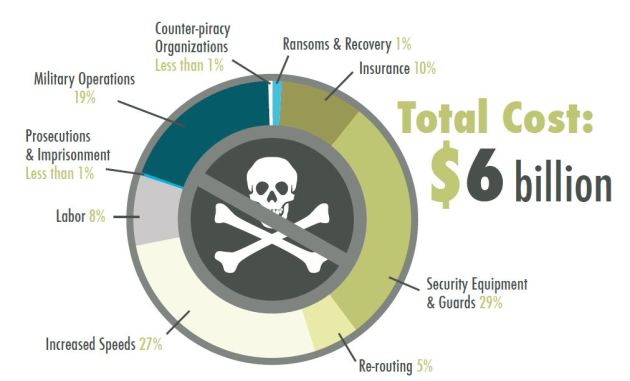The DC Circuit’s Ali Decision
July 5, 2013 2 Comments
On June 11, the U.S. Court of Appeals for the District of Columbia decided the case of United States of America v. Ali Mohamed Ali, a case about which I have written extensively. This post will provide a brief factual and procedural background of the case, briefly discuss the DC Circuit’s treatment of three of the four charges against Ali, and explain how and why the court rejected my argument about a high seas requirement for facilitators of piracy.
Background
Ali Mohamed Ali, the Minister of Education for the semi-autonomous Somali region of Somaliland, negotiated the release of eleven hostages aboard the Bahamian-flagged, Danish-owned merchant vessel CEC Future. Regrettably, in the era of piracy off the Horn of Africa, this is not an uncommon occurrence. What is interesting about Ali’s case, however, is that he negotiated the ransom from Somali territorial waters, never facilitating while on the high seas. Nonetheless, the United States government built a case against him, planned a fairly elaborate ruse to invite Ali to an education conference in North Carolina, and arrested him on the tarmac when his plane touched down in Washington, D.C. on April 20, 2011.
After a number of superseding indictments, a grand jury charged Ali with conspiracy to commit piracy, aiding and abetting piracy, conspiracy to commit hostage taking, and aiding and abetting hostage taking. Ali filed a motion to dismiss and was successful on a number of counts, with the lower court dismissing the conspiracy to commit piracy count, narrowing the aiding and abetting count to acts of facilitation that occurred on the high seas, and dismissing both hostage taking charges as a violation of due process.
On appeal, the DC Circuit affirmed the dismissal of the conspiracy to commit piracy charge, but reversed the dismissal of the hostage taking charges and held that the United States may assert universal jurisdiction over acts of facilitation that take place entirely within the territory of another state.
Conspiracy to Commit Piracy and Hostage Taking Charges
Of the four charges considered by the court, three were relatively uncontroversial. In affirming the lower court’s dismissal of the conspiracy to commit piracy charge, the court relied on the Charming Betsy canon, concluding that because “UNCLOS [art. 101]’s plain language does not include conspiracy to commit piracy,” the government cannot charge conspiracy to commit piracy “as defined by the law of nations.”
As for the hostage taking charges, Ali’s principle argument was that asserting universal jurisdiction over hostage taking – a non-UJ offense – the government violated Ali’s right to due process under the Fifth Amendment of the U.S. constitution. However, the court concluded that the Hostage Taking Convention provided global notice that an alleged hostage taker could be haled into court. That, combined with the fact that 18 USC § 1203, the American hostage taking statute, asserts jurisdiction over all offenders “found in the United States,” was enough to sustain Ali’s hostage taking charges. This section contains some interesting discussion of the relationship between United States and international law, but it remains to the side of what I believe the most interesting aspect of the Ali case: whether universal jurisdiction exists over facilitators of piracy who never leave the territorial jurisdiction of a state.
Aiding and Abetting Piracy
In considering whether “piracy as defined by the law of nations” allows for universal jurisdiction prosecutions over territorial facilitators, the court considered the text of UNCLOS art. 101, the context provided by surrounding provisions, as well as the relevant drafting history. Though it did not consider the underlying policy implications of criminalizing piracy, the structure of the court’s argument closely mirrored that from my law review article. However, the similarities between our analyses went no further.
The court begins with a textual analysis of art. 101, which takes only three sentences and is re-printed in full here:
Explicit geographical limits – ‘on the high seas’ and ‘outside the jurisdiction of any state’ – govern piratical acts under article 101(a)(i) and (ii). Such language is absent, however, in article 101(c), strongly suggesting a facilitative act need not occur on the high seas so long as its predicate act has. So far, so good; Charming Betsy poses no problems.[1]
Although the court could have ended its analysis there, it turned to Ali’s contextual arguments concerning arts. 86 and 105, introducing the relevant Part in UNCLOS and describing states’ power to capture pirates, respectively. Regarding art. 86, the court concluded that it was not meant to limit the provisions of the Part to high seas acts, but rather to explicate the meaning of “high seas” for the purposes of the Part. As for art. 105, the court explained that “the provision’s reference to the high seas highlights the broad authority of nations to apprehend pirates even in international waters.” The court further asserted that Ali’s argument that art. 105 limits universal jurisdiction captures to the high seas “proves too much, leaving nations incapable of prosecuting even those undisputed pirates they discover within their own borders.”
Finally, the court considered UNCLOS’s drafting history, or, as it phrased the inquiry, the “drafting history’s drafting history.” The court traced UNCLOS back to the 1932 Harvard Draft Convention’s explicit pronouncement that acts of facilitation must take place on the high seas to be subject to universal jurisdiction. The court found this evidence unpersuasive, stating that, “[e]ffectively, Ali would have us ignore UNCLOS’s plain meaning in favor of eighty-year-old scholarship that may have influenced a treaty that includes language similar to UNCLOS art. 101. This is a bridge too far.” Indeed, the court stated that it would not completely address the drafting history, as the plain meaning of UNCLOS art. 101(c) was clear.
The court concluded that UNCLOS art. 101, and by extension 18 USC § 1651, and by further extension 18 USC § 2, all allow for universal jurisdiction prosecutions for acts of piratical facilitation which take place entirely with another state’s borders.
In the end, the D.C. Circuit’s analysis and my own departed ways at the very beginning, perhaps even before. In conceptualizing piratical facilitation as a form of liability distinct from piracy rather than piracy in and of itself, the court was able to resolve the textual argument in one short paragraph. From there, the court sought independent justifications for the limitation in the context and drafting history, where I looked to the context, drafting history, and underlying policy rationale to resolve the ambiguous language.
[1] Omitting the internal citation to the general proposition that inclusion of language in one section of a statute and exclusion in another should be taken as purposeful.

